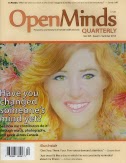Addressing Mental Health through Literature
 I love Open Minds Quarterly magazine. Subtitled, “The poetry and literature of mental health recovery,” I once used this publication in a composition course I taught themed “Understanding Disability.” Not surprisingly, I was met with a great deal of ‘unknowing’ in that class as well as resistance (both reasons for teaching it). Students who used the word “crazy” soon stopped themselves and others from doing so, exploring what the word means in our society. Students who felt that people with depression should “just get over it” came to a more empathetic understanding of the complexities of this mental health issue. Open Minds Quarterly was one of the publications assigned in that class to help students learn, understand, and connect.
I love Open Minds Quarterly magazine. Subtitled, “The poetry and literature of mental health recovery,” I once used this publication in a composition course I taught themed “Understanding Disability.” Not surprisingly, I was met with a great deal of ‘unknowing’ in that class as well as resistance (both reasons for teaching it). Students who used the word “crazy” soon stopped themselves and others from doing so, exploring what the word means in our society. Students who felt that people with depression should “just get over it” came to a more empathetic understanding of the complexities of this mental health issue. Open Minds Quarterly was one of the publications assigned in that class to help students learn, understand, and connect.
Editor Dinah Laprairie’s Welcome in the most recent issue brought back those teaching memories. She writes about attending several festivals where she staffed tables to promote the publication, noting the responses from people who stopped by. “What is memorable,” she writes of these encounters, “is the people who, unexpectedly, in picking up the magazine, get turned inside out by what they see.
Some go quiet and we see their breathing change, deepen. Something they read resonates, and we see something moving beneath their skin that yearns to come out. They read the magazine silently, and avoid eye contact with us.
Others are curious, pick up a copy, but once they glance at the content they drop it like it’s hot, and quickly make their escape with straight backs and pursed lips, like they don’t want to acknowledge they are eing chased by something.
Women will often return to the table supported by a friend, to look more closely. They whisper to each other.
And then there are those who are so relieved to find a magazine such as this that they make the confession they have been hiding, sometimes for years.
‘My brother, he’s bipolar.’
‘My friend, she’s had difficulties.’
‘My son –‘
or
‘Me, too.’
It is an honour to witness these admissions. Something in what we do, in what our contributors have shared, has made it okay for someone to speak up about an unspeakable subject. Yes, the stigma of mental illness is slowly diminishing, but people are still afraid to broach the subject, to shine light on the dark places we’d rather leave dark.”
Open Minds Quarterly definitely does not leave places dark, this newest issue featuring writing of a woman who meets her birth father for the first time – finding him homeless with signs of schizophrenia, another piece by a mother who undergoes electro-shock therapy, and poems wth titles like, “Aunt Dementia” (Jacqualine A. Hart), “Pain Scale” (E.V. Noechel), “Insomnia” (Maureen Comerford), “My On and Off Schizophrenic Friend” (Cecilia Tolley), “Suicide” (Maranda Russell), and “Freedom is not in the DSM” (Samantha Burton).
“More and more people are speaking up,” writes Laprairie. “It takes a multitude of small efforts to open the conversation, but at some point the doors – the formal front doors and the everyday back doors – will be flung wide open.”
Open Minds Quarterly opens those doors and invites both writers and readers to enter and exit freely.
